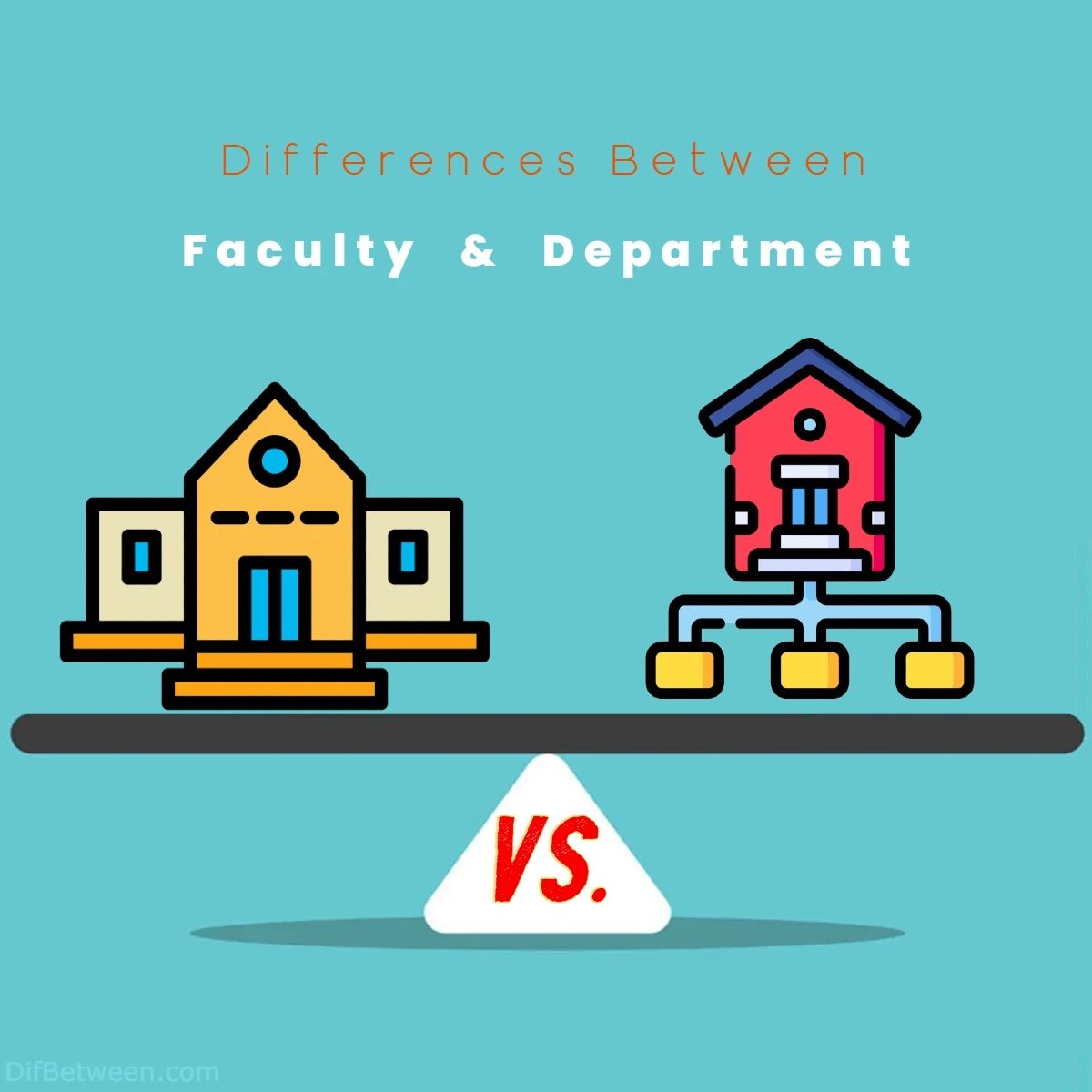
| Aspect | Faculty | Department |
|---|---|---|
| Core Responsibility | Academic instruction, research, and knowledge sharing across multiple disciplines. | Focused on teaching, research, and knowledge advancement within a specific academic discipline or field. |
| Composition | Comprises multiple academic departments. | Consists of faculty members specializing in a single academic discipline or field. |
| Leadership | Headed by a Dean, responsible for overseeing multiple departments. | Headed by a Department Chair, responsible for managing a single department. |
| Focus | Broader and interdisciplinary, encourages collaboration among disciplines. | Specialized and discipline-specific, emphasizes in-depth expertise in a specific field. |
| Resource Allocation and Budgeting | Involved in allocating resources across various departments and interdisciplinary programs. | Responsible for managing resources specific to their discipline and departmental operations. |
| Curriculum Development and Academic Programs | Involved in developing general education programs, interdisciplinary majors, and cross-disciplinary initiatives. | Focus on creating curriculum specific to their academic discipline, defining course requirements, and maintaining disciplinary standards. |
| Research and Scholarly Activities | Facilitates interdisciplinary research and collaboration across fields. | Concentrates on research and scholarly activities within a specific academic discipline. |
| Student Advising and Support | Provides academic advising across various disciplines, offers general academic support services. | Offers academic advising specific to the field of study, may provide discipline-specific support services. |
| Career Goals | Offers opportunities for high-level academic administration roles like Dean or Provost. | Ideal for those seeking tenure-track positions, faculty leadership roles, or department-specific positions. |
| Academic Freedom | Encourages interdisciplinary research and exploration, fosters innovation and cross-disciplinary collaboration. | Promotes in-depth, specialized research and teaching within a single field, adhering to established methodologies. |
| Academic Ecosystem | Thrives in a diverse, interdisciplinary environment with a wide range of faculty and students. | Prefers a close-knit academic community focused on a specific field of study. |
In this engaging odyssey through the realm of academia, we’ll traverse the landscape of Faculty and Department, guided by an entity-based roadmap. Let’s decipher their roles, structures, core responsibilities, and the unique niches they inhabit within the educational ecosystem.
Differences Between Faculty and Department
The main differences between Faculty and Department lie in their scope and focus. Faculty encompasses multiple academic departments and promotes interdisciplinary collaboration, offering a broad academic perspective. Faculty is typically headed by a Dean and encourages a holistic approach to education and research. In contrast, a Department is a more specialized unit, dedicated to a specific academic discipline, field, or subject. It is led by a Department Chair and focuses on in-depth knowledge and expertise within that particular field. Understanding these distinctions is pivotal for students choosing a major or faculty members considering their academic career path.
Defining
Let’s start by defining these terms:
Faculty:
| Attribute | Description |
|---|---|
| Core Responsibility | Academic instruction, research, and knowledge sharing. |
| Composition | Comprises multiple academic departments. |
| Leadership | Headed by a Dean. |
| Focus | Broader and interdisciplinary. |
Department:
| Attribute | Description |
|---|---|
| Core Responsibility | Focused on specific academic disciplines or fields. |
| Composition | Various faculty members and courses. |
| Leadership | Headed by a Department Chair. |
| Focus | Specialized and discipline-specific. |
Now, let’s delve deeper into these distinctions:
Structure and Composition
Faculty
Faculty is an overarching entity within a university that encompasses a diverse range of academic disciplines and fields of study. It functions as the collective body of educators, researchers, and experts who contribute to the institution’s academic mission. A faculty can encompass multiple academic departments, each specializing in a particular discipline. These departments, in turn, are composed of individual faculty members.
The faculty is typically led by a Dean, who is responsible for overseeing the various departments and ensuring the smooth functioning of the academic programs. Deans often have a broad view of the university’s academic landscape and work to facilitate interdisciplinary collaboration among departments.
Department
A department, on the other hand, is a more specialized unit within a university. It is focused on a specific academic discipline or field of study, such as mathematics, biology, psychology, or history. Departments are composed of faculty members who are experts in the respective discipline. These faculty members teach courses, conduct research, and contribute to the body of knowledge within their field.
Departments are headed by Department Chairs, who are typically senior faculty members with administrative responsibilities. They are responsible for managing the department’s day-to-day operations, faculty assignments, and curriculum development. Department Chairs act as a bridge between the faculty and the university administration.
Core Responsibilities
Faculty
The primary mission of a faculty is to advance knowledge through research, disseminate knowledge through teaching, and engage in various forms of academic and professional service. Faculties are responsible for developing and delivering courses, conducting research projects, and publishing scholarly work. They are also actively involved in mentoring and guiding students, both at the undergraduate and graduate levels.
Faculty members often have the freedom to engage in interdisciplinary research and teaching, which is aligned with the broader, more holistic nature of the faculty.
Department
Departments have a more specific and focused role within the university. Their core responsibility is to excel in a particular academic discipline. This involves offering courses that are central to the discipline, conducting research specific to the field, and often adhering to established disciplinary standards and methodologies.
While interdisciplinary collaboration can occur within a department, the primary emphasis is on building expertise within a particular subject area. This focused approach allows for in-depth exploration and advancement of knowledge within a specific field.
Leadership and Administration
Faculty
The leadership of a faculty is typically in the hands of a Dean. Deans are senior academic administrators who oversee the entire faculty and its constituent departments. They are responsible for setting the strategic direction of the faculty, managing budgets, and facilitating collaboration between departments. Deans also serve as a link between the faculty and the university administration.
Department
Each department is led by a Department Chair, also known as a Chairperson or Head of Department. Department Chairs are responsible for the day-to-day management of their respective departments. This includes scheduling courses, assigning faculty to teach, managing department budgets, and representing the department’s interests to the university administration.
Department Chairs often play a crucial role in shaping the curriculum, promoting the department’s research agenda, and ensuring that the department’s activities align with the university’s mission and goals.
Focus and Specialization
Faculty
The faculty’s focus is typically broader and more interdisciplinary. It encompasses a wide array of academic disciplines and fields. Faculties are often organized to encourage cross-disciplinary collaboration and the exploration of interdisciplinary research and teaching opportunities. This allows for a more holistic approach to education and knowledge creation.
Faculty members may have the flexibility to engage with multiple departments and programs, fostering a sense of academic diversity and a broader perspective on education and research.
Department
Departments are specialized units that concentrate on a single academic discipline or field of study. They have a narrower focus and are dedicated to cultivating expertise and excellence within that particular discipline. This specialization allows for a deep and detailed exploration of the subject matter.
While departments may collaborate with other departments or faculties, their primary mission is to advance knowledge and understanding within their specific field.
Interactions and Collaborations
Faculty
Faculty members often have opportunities for interdisciplinary collaborations and engagement with various departments and programs. This interaction can lead to innovative research, diverse teaching approaches, and a richer academic experience for students. Faculties foster a sense of academic community that transcends departmental boundaries.
Interdisciplinary research centers and programs are frequently associated with faculties, providing platforms for faculty members to work together on projects that address complex, multifaceted issues.
Department
Departments primarily collaborate within their own discipline, with a focus on enhancing the knowledge and expertise related to that specific field. While collaborations with other departments and faculties are possible, they often occur on a project-specific basis.
Departmental interactions tend to be more discipline-specific, and their research and teaching activities are closely aligned with the specific academic discipline they represent.
Resource Allocation and Budgeting
Faculty
Faculties often have a role in resource allocation and budgeting within the university. Deans oversee the distribution of resources among the various departments and programs under their purview. This includes determining how funds are allocated for faculty salaries, research grants, equipment, and other resources. They also play a pivotal role in setting priorities and ensuring that resources are used effectively to support the broader educational and research goals of the faculty.
Faculties may also have their own budget for initiatives that promote interdisciplinary collaboration, research centers, and special academic programs that cut across multiple departments.
Department
Departments are responsible for managing their budgets to support the specific needs of their discipline. Department Chairs work closely with faculty members to allocate resources for research projects, teaching materials, and departmental operations. They are accountable for maintaining a balanced budget and ensuring that funds are used efficiently to advance the department’s goals.
While departments have a degree of autonomy in budget management, they must also adhere to university-wide financial policies and guidelines.
Curriculum Development and Academic Programs
Faculty
Faculties often have a role in shaping the university’s overall curriculum. They may oversee the development of general education programs, interdisciplinary majors, and other broad academic initiatives. Faculties are instrumental in designing curriculum structures that provide students with a well-rounded education, exposing them to a variety of academic disciplines.
This broad oversight allows faculties to promote innovative, cross-disciplinary programs that address emerging trends and societal needs. For instance, a Faculty of Science might collaborate with a Faculty of Business to create a data science program that bridges the gap between technology and business.
Department
Departments play a central role in developing and maintaining the curriculum for their specific academic discipline. They are responsible for defining course requirements, creating syllabi, and ensuring that students receive a comprehensive education in their field of study.
Departments have a more specialized focus on curriculum development, ensuring that students gain in-depth knowledge of a particular subject. For example, a Department of History would be responsible for designing history courses, while a Department of Chemistry would oversee the development of chemistry courses.
Research and Scholarly Activities
Faculty
Faculties are often hubs of interdisciplinary research and scholarly activities. They provide a platform for faculty members from various departments to collaborate on research projects that transcend disciplinary boundaries. Faculties may establish research centers, institutes, or programs that encourage cross-disciplinary research in areas of societal importance, such as environmental studies, public health, or artificial intelligence.
Faculties are also responsible for promoting and supporting faculty research, securing research funding, and disseminating research findings through conferences and publications.
Department
Departments primarily focus on research and scholarly activities within their specific discipline. Faculty members within a department engage in research that contributes to the body of knowledge within that field. Research conducted by a Department of Psychology, for example, would concentrate on psychology-related topics, such as cognitive psychology, clinical psychology, or behavioral neuroscience.
While some cross-disciplinary research can occur within departments, their primary mission is to advance knowledge and expertise in their specialized field.
Student Advising and Support
Faculty
Faculty members within a faculty often take on roles as academic advisors to students. They assist students in selecting courses, defining academic and career goals, and navigating their educational journey. Faculty advisors can offer valuable insights into the broader academic landscape and may provide guidance on interdisciplinary program choices.
Faculties also house academic support services that are available to all students, offering resources such as writing centers, tutoring services, and career counseling.
Department
Departments generally focus on academic advising related to a specific field of study. Faculty advisors within a department guide students on curriculum choices, research opportunities, and career paths directly aligned with that discipline. They are well-versed in the academic requirements and opportunities within their department.
Departments may provide specialized support services tailored to the needs of students majoring in that particular field. For example, a Department of Engineering might offer engineering-specific career advising and internship opportunities.
Faculty or Department: Which One is Right Choose for You?
When embarking on your academic journey or considering a career in academia, you might be faced with a fundamental choice: should you align yourself with a Faculty or a Department? Understanding the key differences between these two entities is crucial in making an informed decision. Whether you’re a prospective student selecting a major or a faculty member contemplating your professional path, let’s explore the factors that can help you determine which one is the right fit for you.
Consider Your Academic Interests
Faculty
Choose a Faculty if:
- You have a broad range of academic interests and want exposure to various disciplines.
- You enjoy interdisciplinary collaboration and want to explore connections between different fields.
- You’re uncertain about your major and want the flexibility to explore multiple options before making a decision.
- You’re interested in general education programs and cross-disciplinary majors.
Example: If you’re passionate about addressing complex real-world challenges that require knowledge from multiple disciplines, a Faculty may provide the ideal environment for your academic exploration.
Department
Choose a Department if:
- You have a strong, specific interest in a particular academic discipline or field.
- You’re already certain about your major and want to immerse yourself in in-depth study within that field.
- You’re focused on advancing knowledge and expertise in a specialized area.
- You have a clear career path in mind that aligns with a specific discipline.
Example: If you’ve always been fascinated by biology and dream of becoming a research scientist in the field, aligning with a Department of Biology would be a natural choice.
Evaluate Your Career Goals
Faculty
Choose a Faculty if:
- You aspire to a role that involves leadership, strategic planning, and overseeing a wide range of academic disciplines.
- You’re interested in roles like Dean, Provost, or other high-level administrative positions within an educational institution.
- You see yourself fostering collaboration among departments and creating cross-disciplinary programs.
Example: If you envision a career in higher education administration, where you can shape the overall academic direction of a university, aligning with a Faculty can be a stepping stone.
Department
Choose a Department if:
- You’re committed to becoming a subject matter expert in your chosen field and want to pursue a tenure-track position.
- You’re passionate about teaching, research, and scholarly activities within your specific discipline.
- You aim to become a Department Chair or hold leadership roles within a department or field.
Example: If you’re dedicated to advancing research and teaching in the field of economics, aligning with a Department of Economics would be a logical choice.
Explore Your Academic Freedom
Faculty
Choose a Faculty if:
- You value the freedom to engage in interdisciplinary research, teaching, and collaboration across multiple departments.
- You’re interested in developing new interdisciplinary majors and programs.
- You want to contribute to solving complex societal issues that require a holistic approach.
Example: If you’re excited about the idea of working on a research project that combines elements of computer science, environmental science, and public policy, aligning with a Faculty can provide the academic freedom to pursue such endeavors.
Department
Choose a Department if:
- You’re committed to advancing the body of knowledge within a specific field and adhering to its established methodologies and standards.
- You prefer a focused, specialized approach to research and teaching.
- You appreciate the depth of expertise that comes with specializing in a single discipline.
Example: If your passion lies in the intricacies of cultural anthropology and you want to immerse yourself in the study of a specific culture, aligning with a Department of Anthropology allows you to do just that.
Consider the Academic Ecosystem
Faculty
Choose a Faculty if:
- You thrive in a dynamic, interdisciplinary academic environment with diverse faculty and students.
- You’re excited about the prospect of participating in or leading cross-disciplinary research centers or programs.
- You see value in connecting with faculty members and students from various backgrounds and fields of study.
Example: If you find inspiration in the exchange of ideas and perspectives from multiple disciplines, a Faculty might offer the vibrant academic ecosystem you seek.
Department
Choose a Department if:
- You’re deeply passionate about the culture and traditions of a particular academic discipline.
- You prefer a close-knit academic community focused on a specific field.
- You appreciate the opportunity to collaborate with colleagues who share your specialized interests.
Example: If you’re captivated by the traditions and history of the field of literature and find fulfillment in connecting with like-minded scholars, a Department of Literature may provide the academic ecosystem you desire.
Seek Guidance and Flexibility
Ultimately, your choice between a Faculty and a Department should align with your academic and career aspirations. It’s important to keep in mind that your academic journey can evolve, and you may have opportunities to explore both faculties and departments during your educational and professional path. Seek guidance from mentors, advisors, and professors to make an informed decision that resonates with your unique interests and goals.
In the ever-evolving landscape of higher education, both Faculties and Departments play pivotal roles in shaping the academic experience. Your choice will depend on your individual passions, career objectives, and the academic environment in which you thrive. Whether you find your niche within a specific department or your calling within the broad horizons of a faculty, both paths offer valuable contributions to the world of learning and knowledge.
FAQs
The primary difference lies in their scope and focus. Faculty comprises multiple academic departments and encourages interdisciplinary collaboration. It is headed by a Dean and offers a broader, more holistic perspective. In contrast, a Department is discipline-specific, focused on a single academic field, led by a Department Chair, and prioritizes in-depth expertise within that discipline.
Faculties often design interdisciplinary programs and general education courses, while Departments focus on developing curriculum specific to their field of study. Faculties promote cross-disciplinary initiatives, while Departments adhere to established disciplinary standards.
Faculties facilitate interdisciplinary research and collaboration across fields, fostering innovation. In contrast, Departments concentrate on research and scholarly activities within their specific discipline, adhering to established methodologies.
Faculty offers a broader view and flexibility for students exploring different fields before making a decision. Departments are ideal for students with a clear major in mind, seeking in-depth knowledge in a specific discipline.
Faculty provides general academic support services and advisors across disciplines. Departments offer academic advising specific to their field and may provide discipline-specific support services.
Yes, transitions are possible. Faculty members may engage in interdisciplinary work and later assume roles in faculties, and Department Chairs can become Deans. Academic journeys can evolve, offering opportunities for cross-disciplinary experiences.
Faculties are involved in allocating resources across departments and interdisciplinary programs, while Departments manage resources specific to their discipline and departmental operations.
Faculty roles align with individuals aspiring to high-level administrative positions like Dean or Provost. Departments are more suitable for those aiming for tenure-track positions or faculty leadership within a specific discipline.
Read More:
Contents






